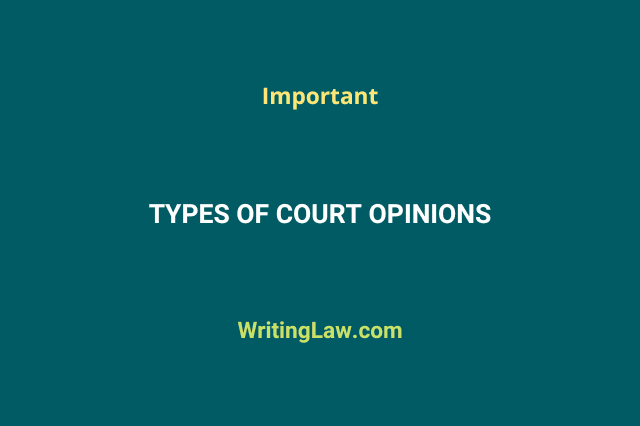
In any research, including an assessment of case law, judges’ opinions and what they say and decide in diverse factual situations may be pretty valuable.
In this law note, you will read about the five types of court opinions that constitutional courts like the Supreme Court and High Courts give.
Five Types of Court Opinions
A High Court in India has both original and appellate jurisdiction, meaning it hears cases for the first time (submitted by a party in a civil case or the prosecution in a criminal case) and also considers appeals against lower court’s decisions. A single judge normally resolves the matter at the High Court level.
The Supreme Court often meets in panels to consider appeals and hear any cases brought before it under its original jurisdiction.
A panel (also known as the bench) is usually made up of three judges. A wider panel of judges may be formed if the case involves a significant constitutional legal problem. An appeal may be heard by a panel (bench) of all the judges of the court in some instances.
There are five types of court opinions that a High Court or Supreme Court gives:
1. Majority Opinion
A majority opinion is one that is expressed by the majority of the judges deciding a matter. In most situations, only one judge writes the opinion (delivers the decision), and the other judges concur (agree; be of the same opinion). A judge who agrees with the decision in a case usually simply writes: ‘I agree…‘
2. Concurring Opinion
In some cases, the majority of the court agrees to rule in a given way, yet some judges write distinct concurring (agreeing) views in the form of separate judgments. Concurring opinions, while agreeing with the majority’s judgement, may differ significantly in their reasoning for reaching a certain conclusion. Because the actual legislation is not revealed, the researcher must exercise caution when studying such circumstances. Each concurring opinion must be carefully examined to determine the case’s ratio.
3. Dissenting Opinion
A dissenting opinion is one in which a judge disagrees with the prevailing opinion. When a case contains multiple issues, a judge may write a concurring opinion on one or more of them while writing a dissenting opinion on others. A dissenting opinion is not legally binding, even if it appears more logical than the majority view and may have persuasive authority.
4. Plurality Opinion
The term plurality opinion describes a situation in which a case is considered by several judges and one view is accepted by more judges than any other opinion put forth by some other judges.
5. Per Incuriam
The term per incuriam is used to signify that a superior court’s opinion on an issue was given in ignorance of existing law or decision, or that the right legal position was not brought to the court’s knowledge.
In this scenario, the researcher’s duty becomes more challenging since the researcher is expected to determine the correct legal position on a specific issue. An opinion given per incuriam is usually brief. In this instance, a researcher must use caution because a per incuriam opinion has little weight unless it is given weight in a subsequent case. It should be noted that most per incuriam opinions are based on cases decided earlier.
Conclusion
The decision sets a precedent for how other legislators and courts should interpret the law (or the Constitution). It has the authority to declare a statute unconstitutional or uphold it as valid, to direct parties to prior decisions and give them guidance on how to apply them, and to remand (return) cases to subordinate courts for additional deliberation.
Read Next:
1. Impact of Pending Cases in Indian Courts
2. What Is Court Demeanour and the Tips to Maintain It?
3. Pros and Cons of Regional Benches of the Supreme Court of India
- What Is the Burden of Proof Under the PMLA? - 18th April 2024
- Ranjit D Udeshi vs State of Maharashtra – Case Explained - 11th April 2024
- What Is Proceeds of Crime Under PMLA (With Case Laws) - 7th April 2024







